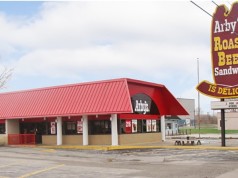Environmental Assurance Program Verifies First Greenhouse: Kalamazoo County operation recognized by program
KALAMAZOO, Mich. – The Michigan Department of Agriculture (MDA) and Michigan State University (MSU) today applauded Elzinga & Hoeksema Greenhouses for taking the lead in environmental responsibility by becoming Michigan’s first greenhouse operation to become verified by the Michigan Agriculture Environmental Assurance Program (MAEAP). The program assists farmers in complying with state and federal environmental regulations as well as right-to-farm practices.
“MAEAP is designed to be one of the most effective and feasible ways for producers to position their farms to safeguard both the environment and the long-term economic viability of their farm,” said Don Koivisto, Michigan Department of Agriculture director. “By sharing technological information as well as monitoring and recording changes in the way producers manage problems, MAEAP helps farmers find solutions for potential pollution issues.”
More than 500 Michigan farms are MAEAP-verified, but Elzinga & Hoeksema is the first greenhouse to complete the comprehensive Greenhouse*A*Syst risk assessment, which pinpoints best practices in water, fertilizer and pesticide use.
Project GREEEN (Generating Research and Extension to meet Economic and Environmental Needs), Michigan’s plant agriculture initiative housed at Michigan State University, funded the development and promotion of the Greenhouse*A*Syst risk assessment tool. Technical assistance was provided by Linda Zabik of the Kalamazoo Conservation District in partnership with Jeanne Himmelein, MSU Extension (MSUE) commercial horticulture educator.
“Since 1997, Project GREEEN has funded research and extension projects according to what plant commodity groups tell us are their most pressing issues,” said Doug Buhler, associate director of the Michigan Agricultural Experiment Station and Project GREEEN coordinator. “This interagency, interdisciplinary team really made Project GREEEN’s investment go a long way in fulfilling our mission of meeting industry needs and protecting and preserving the quality of the environment.”
Elzinga & Hoeksema Greenhouses is one of southwestern Michigan’s largest greenhouse operations, with five locations and more than 30 acres of product. The East O Avenue greenhouse features energy-efficient equipment and renewable energy sources such as wind turbines in addition to the largest solar thermal system in the Midwest. Outside the greenhouse is a large heat pump, 200 four-feet-wide by 10-feet long solar energy collectors, a 60,000-gallon insulated water tank, and 23 miles of tubing sunk in 200 wells, each 300 feet deep. This system provides 80 percent of the greenhouses’ heating needs; the other 20 percent is met by high efficiency boilers.
“With the assistance, guidance and cooperation from both MSUE and the Michigan Groundwater Stewardship Program, we have been able to successfully navigate a path for achieving our goal of responsible stewardship and accountable sustainability,” said Mark Elzinga, President of Elzinga & Hoeksema Greenhouses. “The Greenhouse*A*Syst tool provided a clear route to MAEAP verification, which validated our efforts.”
To become MAEAP-verified, farmers must complete three comprehensive steps: educational seminars, a thorough on-farm risk assessment, and development and implementation of an action plan addressing potential environmental risks. The MDA conducts an on-farm inspection to verify program requirements related to applicable state and federal environmental regulations, Michigan Right-to-Farm Act guidelines and adherence to an action plan. When the inspection is completed, the producer receives a certificate of environmental assurance. To retain MAEAP verification, a farm must be inspected every three years and implement any required changes.
MAEAP is a multiyear program that allows producers to meet personal objectives while managing time and resources effectively. The program encompasses three systems-livestock, farmstead and cropping- to help producers evaluate the environmental risks of their operation. Verified greenhouses meet all requirements in both the farmstead and cropping systems.
The MAEAP is a collaborative effort of producers, the MDA, the Michigan Department of Environmental Quality, MSU, Michigan Farm Bureau, commodity organizations, conservation groups and other state and federal agencies. More than 150 local coordinators and technical service providers are available to assist farmers as they move through the MAEAP process toward verification. To date, approximately 5,500 farmers have attended educational programs, and more than 500 have been verified.
For more information, visit the MAEAP Web site at www.maeap.org or contact Jan Wilford, MDA Environmental Stewardship Division, at 517-241-4730.




